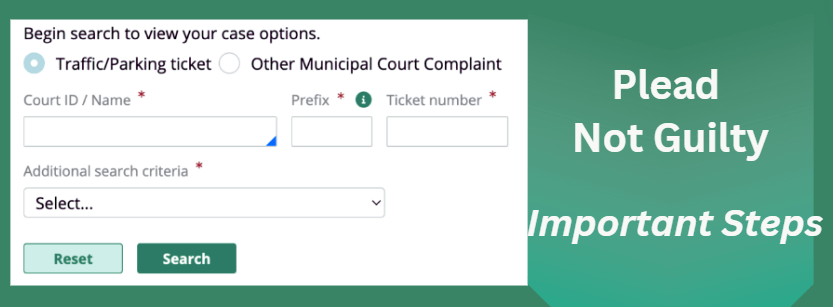Navigating traffic violations can be stressful, particularly if you’re unfamiliar with legal procedures. In New Jersey, traffic violations can vary from minor infractions to serious offenses, each with consequences. If you believe a ticket was issued incorrectly or wish to contest it, pleading not guilty is a crucial step. This guide outlines the process and potential outcomes and answers frequently asked questions to help you understand and navigate the system effectively.
Understanding Traffic Violations in New Jersey
Traffic violations in New Jersey are categorized into three main types:
- Moving Violations: These include offenses like speeding, running red lights, and reckless driving. They typically result in points on your driving record and can affect insurance rates.
- Non-Moving Violations: Infractions such as parking tickets or equipment violations (e.g., broken tail lights) fall into this category. They usually don’t impact your driving record but can result in fines.
- Criminal Traffic Violations: Serious offenses like Driving Under the Influence (DUI), driving with a suspended license, or hit-and-run incidents. These can lead to severe penalties, including potential jail time.
Why Plead Not Guilty?
Pleading not guilty is essential if you believe the citation is incorrect, if there’s insufficient evidence against you, or if you have legal defenses that could lead to a dismissal or reduction of charges. Here’s why you might choose this route:

- Dispute Facts: You believe the ticket was issued based on incorrect information.
- Challenge Evidence: The evidence against you is weak or flawed.
- Utilize Legal Defenses: There are legal arguments that could negate the charges or reduce penalties.
When Should You Defend Against a Traffic Violation in NJ?
- Using a no-passing zone
- Not keeping right
- Careless driving
- Not paving the way for an emergency vehicle.
- Improper passing
- Speeding
- An improper U-Turn
- Following very closely
- Not maintaining a lane.
- Wrong backing
- Refusing to stop
- Passing a school bus
- Not signaling a turn.
- Improper backing
How to Plead Not Guilty
1. Review Your Ticket
Examine the ticket for accuracy, including the date, time, location, and violation details. Check for any errors, as these could be beneficial to your case.
2. Follow Instructions
The ticket will include instructions on how to plead. This usually involves notifying the court by mail, online, or in person. Adhere to these instructions and deadlines carefully.
3. Schedule Your Court Date
After submitting your not guilty plea, the court will set a date for your hearing. You’ll receive a notice with the specifics of when and where to appear.
4. Prepare Your Case
Gather evidence to support your defense, such as:
- Witnesses: People who saw the incident or can provide relevant testimony.
- Documentation: Photos, diagrams, and records that support your claim.
- Legal Research: Understanding relevant laws and regulations.
5. Attend Your Hearing
Arrive early, dress professionally, and be prepared to present your case. Follow court protocols and address the judge respectfully. Present your evidence clearly and concisely, and be prepared to cross-examine witnesses if necessary.
Possible Outcomes
1. Dismissal: Your case may be dismissed if the evidence is insufficient or if there were procedural errors. 2. Reduction: The charges or penalties may be reduced based on your defense arguments. 3. Guilty Verdict: If found guilty, you may face fines, points on your license, or other penalties. Consider taking a defensive driving course to mitigate the impact of points.
FAQs
1. What if I miss my court date?
Missing your court date can result in a default judgment against you, which may include additional fines and penalties. Contact the court immediately if you miss your date to reschedule or discuss options.
2. Can I represent myself in court?
Yes, you can represent yourself, but consulting with an attorney specializing in traffic violations can be beneficial. They can offer expert advice, negotiate on your behalf, and represent you effectively.
3. How can I reduce points on my license?
Points can be reduced by taking a defensive driving course, which may also help lower insurance premiums. Check with the New Jersey Motor Vehicle Commission (MVC) for specific options.
4. What should I do if I’m unhappy with the court’s decision?
If you’re dissatisfied with the outcome, you may have the option to appeal. Consult with a lawyer to understand the grounds for appeal and the process involved.
5. Will pleading not guilty affect my insurance rates?
Pleading not guilty itself doesn’t directly affect your insurance rates, but the outcome of your case might. Insurance companies often review driving records, and a conviction can lead to higher premiums.
Conclusion
Pleading not guilty to a traffic violation in New Jersey involves a series of steps designed to challenge the citation effectively. Start by reviewing your ticket, follow the court’s instructions to submit your plea, and prepare thoroughly for your hearing. Gather evidence, understand potential outcomes, and be prepared to present your case clearly.
While representing yourself is an option, consulting with a traffic attorney can provide valuable expertise and increase your chances of a favorable outcome. Navigating the legal system with confidence and preparation is key to addressing traffic violations and minimizing potential penalties.
By understanding the process, gathering evidence, and adhering to court procedures, you can address traffic violations in a manner that protects your driving record and mitigates the impact on your insurance and overall driving status.
New Jersey Traffic Guides
- www.njmcdirect.com español
- Njmcdirect.Com
- www.njmcdirect.com online payment
- www.njmcdirect.com ticket payment
- NJMCDIRECT PLEAD NOT GUILTY
- NJ MVC registration renewal
You made some first rate factors there. I appeared on the web for the difficulty and located most individuals will go together with along with your website.